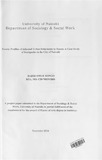| dc.description.abstract | The study set out to establish the poverty level of informal urban settlements in Kenya by doing a case study of Korogocho slum settlement in the city of Nairobi. It was guided by five objectives which were to: aassess the level of poverty of households in Korogocho area; establish characteristics of households in Korogocho settlement; eexamine access to and utilization of basic social services by the residents of Korogocho; find out local perception of needs and priority to be considered in the formulation of policies and programs to reduce poverty and finally to fmd out services and utilities that exist in Korogocho slum settlement.
The study was conducted in Korogocho, a slum settlement covering an area of 1.5 square kilometres and located 11 kilometres northeast of Nairobi City centre. The slum has an estimated population of approximately 150,000 to 200,000 people. The triangulation method (case survey and case study designs) was used to collect data. Through purposive and non- probability sampling technique, the researcher selected four villages (Gitathuru, Nyayo, Ngomongo, and Kisumu Ndogo) in which 120 household heads, four focus groups, and eight key informants were interviewed.
The study findings indicate that Korogocho has high rates of poverty, insecurity, poor housing, and insufficient social utilities. Poverty was as a result of unemployment, low levels of education, and orphanhood mainly due to HIV/AIDs. Insecurity was found to be high and it was ironically attributed by the respondents to vigilante groups and the police. Key among the needs of the slum dwellers in Korogocho were unemployment, and provision of social amenities.
The main recommendations of this study are that: The government and other relevant agencies should provide adequate and affordable housing, construct and equip new schools, or expand existing ones, address adverse environmental and sanitation problems and assist in the creation of jobs/employment and encourage and promote self-employment for income generation. The government, City Council of Nairobi and stakeholders should also provide sufficient and affordable health care facilities and increase surveillance and/or presence in the area.
Further research should he done in several other slums to have a wide understanding of the poverty situation in slum settlements. There is also need to critically consider and evaluate the role of community based organizations (CBOs) and self-help groups in addressing poverty in slum settlements. Finally there is need for further research to detennine the influence of small and medium enterPrises in enhancing economic growth in slum settlements. | en_US |

